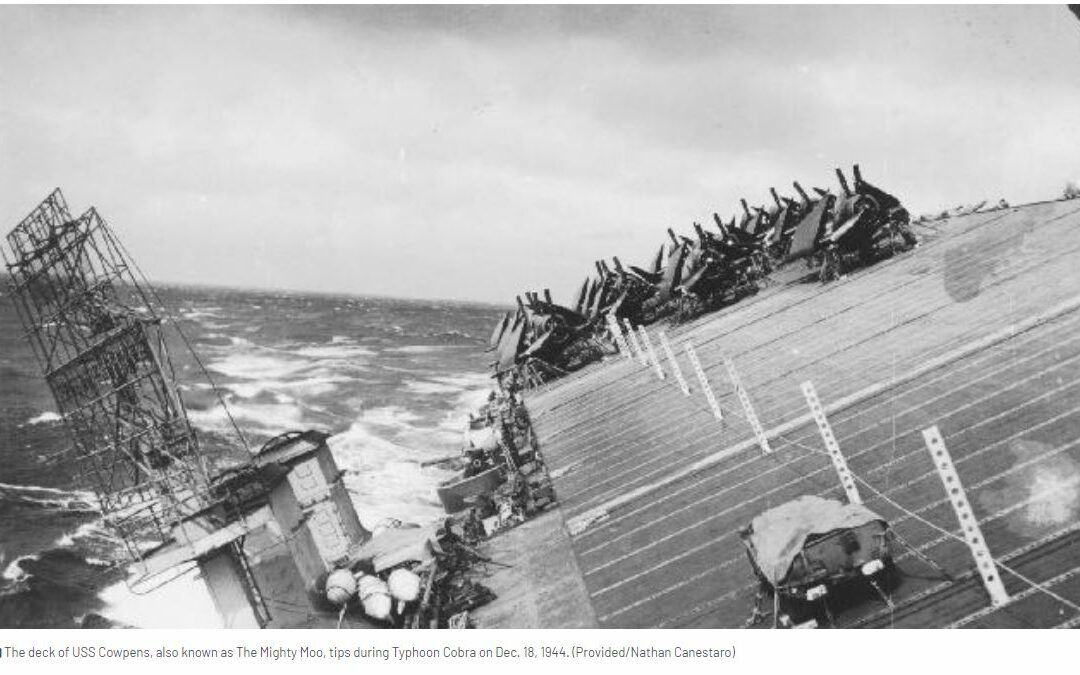SOUTH CAROLINA: How a Revolutionary War battle in SC helped name two Navy ships, a festival and a book
When Revolutionary War troops fought the Battle of Cowpens in 1781, the name only made sense: The area, now near Spartanburg, was dotted with literal cow pens.
In the more than 240 years since then, that name has come to connect a small Upstate town with two Naval ships, an annual festival and, most recently, a book.
Every year, veterans and their families travel to the town of Cowpens alongside thousands of other people for the three-day Mighty Moo Festival, which celebrates the two naval ships named after the town and affectionately nicknamed the “Mighty Moos.”
Like past years, this year’s festival, held June 13-15, will include a golf tournament, a carnival, dance performances, fireworks and a parade featuring current and former crew members.
Author Nathan Canestaro of Washington, D.C., will attend to speak about his new book, detailing the history of the USS Cowpens, on which his late grandfather served.
Canestaro’s book — “The Mighty Moo: The USS Cowpens and Her Epic World War II Journey from Jinx Ship to the Navy’s First Carrier in Tokyo Bay” — will go on sale June 11, just in time for the festival.
The community was part of what inspired Canestaro to write the book in the first place, he told the SC Daily Gazette.
Cowpens is the only place he could find that throws a festival celebrating a specific ship, he said.
“This little town 200 miles from the nearest saltwater has a connection to the Navy, and that in itself is unique,” Canestaro said.
USS Cowpens
Cowpens, a town of just 2,100 people between Spartanburg and Gaffney, has always been proud of its ties to history, said town administrator Steve Bolin.
The nearby Revolutionary War battle from which the town is named was a complete victory for the Patriots — a surprising win that turned the tide of the war and set the groundwork for the British defeat at Yorktown nine months later, according to the National Park Service. (Cowpens National Battlefield has been part of the Park Service since 1933.)
As the story goes, when World War II began, Cowpens drugstore owner George Dean Martin wrote a letter to then-President Franklin D. Roosevelt asking him to name an aircraft carrier after the battle, which was customary at the time. Roosevelt agreed, and the USS Cowpens launched in 1943.
The USS Cowpens served in the war for just under two years, participating in a dozen battles, launching more than 10,000 planes and destroying hundreds of enemy planes and dozens of merchant ships. It was decommissioned in 1947, according to the National Park Service.

“That’s a lot of activity for a very, very short period of time,” Canestaro said.
After the U.S. dropped atomic bombs on Japan, the USS Cowpens was the first airship carrier in the Tokyo Bay. Her crew watched Japanese officials surrender, and the sailors onboard were among the first to set foot on Japanese soil afterward, Canestaro said.
All that was despite the ship being often overlooked by the Navy and staffed by rookies, Canestaro said.
“It’s just a tremendous underdog story,” Canestaro said.
The Mighty Moo Festival
Despite only being connected by a name, the ship’s story intrigued the people of Cowpens. In 1977, the town renamed its annual town festival to the nickname of the ship, The Mighty Moo, and invited crew members to attend.
Only one sailor took up the offer. But the festival continued, and by the early 1980s, more than 100 former crewmen had traveled to Cowpens, according to the town’s website.
But when the Navy launched a second USS Cowpens in 1989 — this time a guided missile cruiser — attendance swelled. Crews from the original and new ship would travel from around the world for three days of festivities each year, sometimes numbering in the hundreds.
“It’s a lot like a high school reunion, like a college reunion, like a family reunion,” said Jan Humphries, one of the festival’s coordinators.
At least one crewman met his wife at the festival, Humphries said.
Another handful have moved to the area after retiring. The festival is often the only chance crew members have to reconnect years after their service, and many tell stories about their service for the first time when they visit, she said.
For the first few years, veterans stayed with local families. The relationships they formed have allowed the festival to continue for five decades, Humphries said.
“They’re additional parts of our families and our lives,” said Humphries, who called herself an “honorary daughter” to many families that visited over the years.
Crew members now stay in local hotels, but crew members and their “adopted” local families still have an annual private dinner to catch up.
Altogether, the festival draws in as many as 4,000 people each year — double the town’s population. The town has embraced the festival, and residents look forward to it every year, the same way they look forward to major holidays, Bolin said.
“It’s so much a part of us that it’s hard to picture anything else,” Bolin said.
‘The Mighty Moo’
Canestaro always regretted that his grandfather never joined his fellow crew members for the festival.
Like many veterans, he didn’t like to talk about his service, Canestaro said.
Once his grandfather died in 2010, Canestaro began digging into the history of the ship, curious about the story he had heard growing up.
One story in particular piqued Canestaro’s interest. In 1944, a typhoon struck the Cowpens, rocking the boat nearly 45 degrees from side to side. Bombs and airplanes broke loose, and crew members had to wait until the ship was upright to try and tie them back into place before the waves would make it tip again.
The ships sailing alongside the Cowpens lost 790 officers during the storm, including the crews of three destroyers that capsized. Miraculously, the Cowpens survived with only one casualty. When officers reported the storm to the Navy, they wrote that the crew “looked into the face of God,” Canestaro said.
“This document was written like a thriller,” Canestaro said.
Intrigued, he tracked down crew members’ diaries, and he began to put together a narrative of what the war was like for the sailors onboard. For the first time, Canestaro began to understand what it might have been like for his grandfather, he said.

The more he dug into the story, the more he thought people needed to know about it.
“Because it’s such a little-known story, and I have a personal connection to it, I feel like I’ve got an obligation to my grandfather and the town and the families of the veterans to tell this tale of incredible heroism and service,” Canestaro said.
In 2015, Canestaro visited Cowpens’ Mighty Moo Festival for the first time. He’s returned several times, including twice for the festival and a handful of times for trips to the local museum, which displays items from both USS Cowpens ships.
Last year, legislators approved allocating $100,000 to that museum for improvements. (This year, Senate Finance Chairman Harvey Peeler, R-Gaffney, is sponsoring $200,000 in the state budget for Cowpens’ Veterans Memorial Park. That hasn’t been finalized yet.)
Even though Canestaro’s grandfather never actually came to the festival, the people of Cowpens welcomed him with the same warmth as they did the families of all the other veterans, he said.
“It was just this unconditional acceptance, which was absolutely wonderful,” Canestaro said.
USS Cowpens… two
The future of the festival became uncertain in March, when the Navy announced it will decommission the current USS Cowpens.
“That really hurt our feelings,” Humphries said.
Already, the mayor is writing to elected officials asking them to commission a third USS Cowpens, keeping the tradition alive. Because the news is so new, any process is still in the beginning stages, Bolin said.
And the festival will continue as long as there are USS Cowpens crew members to attend, said Teresa Carter, one of the festival’s organizers.
Only two sailors from the original ship are still alive, as far as festival organizers are aware. One of the two will turn 100 on June 13, the festival’s start, and he plans to be there, Humphries said.
Other sailors from the more recent ship continue to attend, and Carter hopes they will keep doing so for as long as possible.
“We have the heart to make it go for as long as we can,” Carter said.



